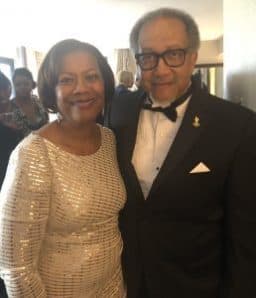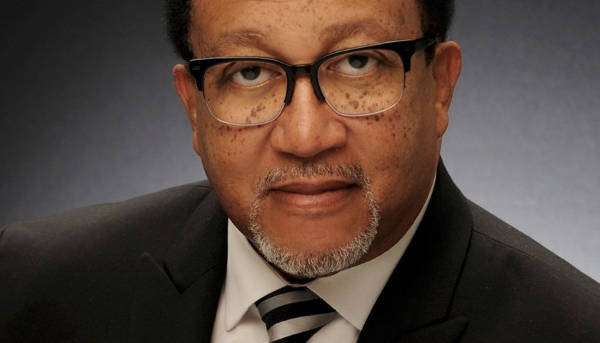By Stacy M. Brown, NNPA Newswire Correspondent
@StacyBrownMedia
Presidents have traditionally attended and spoken at the White House Correspondents’ Association (WHCA) Dinner in Washington, D.C., but President Donald Trump has chosen to hold competing rallies on the night of the event each year since taking office.

NNPA President and CEO, Dr. Benjamin F. Chavis Jr. (right) and AARP’s Senior Vice President of Multicultural Leadership Edna Kane Williams.
While Trump was riling up his base in Wisconsin on Saturday, April 27, National Newspaper Publishers Association (NNPA) President and CEO Dr. Benjamin F. Chavis Jr., was among this year’s Dinner’s distinguished attendees at the Washington Hilton.
“We are assembled together from across the nation as the media of America at a time when the Trump administration continues its frontal assault on the freedom of the press,” said Chavis, who received an invitation to attend the event from Urban Radio Network White House Correspondent April Ryan and AARP’s Senior Vice President of Multicultural Leadership Edna Kane Williams.
“The Black Press of America, represented by the NNPA, will not be silent at this critical moment in history,” Chavis said.
“The NNPA will continue to speak truth to power and we will defend the freedom of the press without fear or hesitation and I am proud that the Black Press of America remains on the front lines of the struggle for freedom, justice and equality,” he said.
The yearly dinner serves as a fundraiser for WHCA scholarships.
It’s a gathering of journalists who cover the president and administration. Traditionally, a noted comedian has served as host and usually roasts presidents, politicians and just about anyone associated with the White House as well as many members of the media in attendance.
In previous years, presidents from Bill Clinton and George W. Bush to Barack Obama have used the occasion to poke fun at others and themselves.
“The fact is I feel more loose and relaxed than ever,” Obama famously said at the dinner in 2015. “Those Joe Biden shoulder massages feel like magic,” he said.
Later, Obama joked: “Dick Cheney said I was the worst president of his lifetime, which is interesting because I think Dick Cheney is the worst president of my lifetime.”
At his final Correspondents’ Dinner as president in 2016, Obama famously finished his speech with a mic drop.
Last year, comedienne Michelle Wolf notoriously roasted White House Press Secretary Sarah Sanders and other members of Trump’s administration.
“I actually really like Sarah. I think she’s very resourceful,” Wolf said in skewering Sanders during the 2018 dinner. “She burns facts, and then uses the ash to create a perfect smoky eye. Maybe she’s born with it; maybe it’s lies. It’s probably lies,” Wolf joked.
Ron Chernow, a political historian and author and this year’s featured speaker quoted Will Rogers during his speech noting that “people are taking their comedians seriously and their politicians as a joke, and that certainly describes our topsy-turvy moment.”
Even though this year’s theme was “Protecting the First Amendment,” the White House ordered staff to boycott the dinner and Trump once again took to Twitter to call the media “the enemy of the people.”
WHCA President Olivier Knox led a toast to the First Amendment in his opening remarks before calling Trump out for his anti-journalism rhetoric.
“I’ve had to teach my family not to touch packages on our stoop. …I’ve had death threats — including this week — and too many of us have,” Knox said.
“We should reject politically expedient assaults on the [media] …,” he continued, before shining a light on journalists who’ve put their lives on the line around the globe.
He also called for the support of state and local journalism and asked those in the audience who cover the White House to stand and be acknowledged.
WHCA also presented scholarships to students from a number of universities from around the country, including Historically Black Howard University.
“While tonight is a festive occasion, this is the time for the voice of the Black community to be at its strongest and thus we are committed to making the Black Press of America stronger and fully aligned with the aspirations of the nearly 50 million African Americans who are striving to improve our quality of life in every aspect of America’s progress and advancement,” Chavis said.


